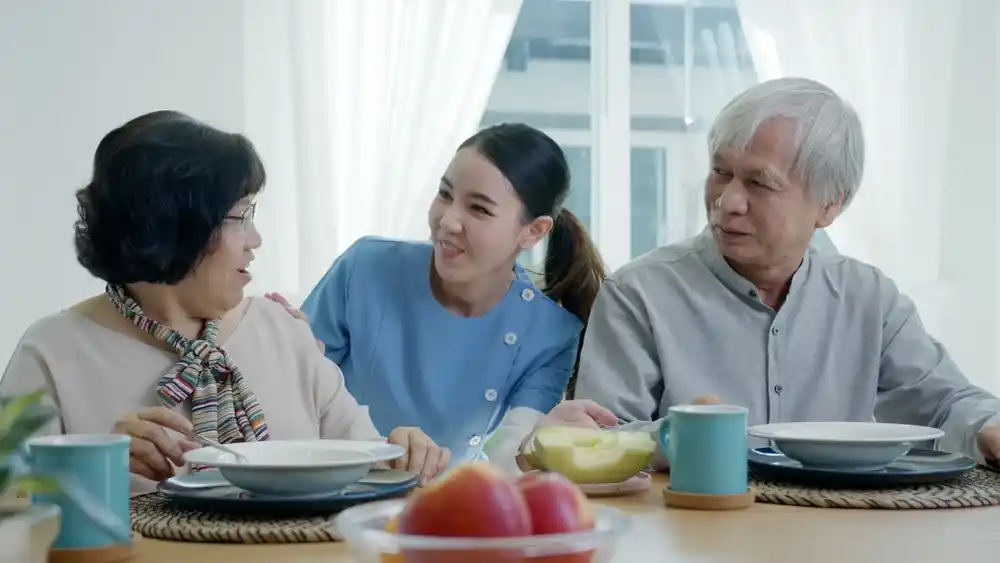What should you do when a loved one in hospice care stops eating?
To many people, food is one of life’s greatest pleasures. And we all know that food is sustenance – the nutrients supply us with the energy we need to remain healthy. So, when someone we love doesn’t want to eat, it can be quite distressing.
In the advanced stages of a terminal illness, food may become less important. Eventually, it’s quite common for a hospice patient to lose their appetite altogether. When that happens, family and friends often find comfort in seeing the individual eat. However, nutritional needs change at the end of life, and as difficult as it may be, following their lead is important. Below, the professionals at Suncrest of Chicago share more on the role of nutrition in hospice care.
 End-of-Life Nutrition
End-of-Life Nutrition
Why do hospice patients have less of an interest in food?
As time goes on, terminally ill individuals simply don’t experience hunger as they once did. The body begins to shut down when a person is dying, and that being so, significantly less in the way of nutrition is required. Also, with some terminal illnesses, patients experience frequent nausea or a change in taste, both of which can diminish the desire to eat.
In hospice care, dietary support is provided, and hospice dietitians do all they can to address issues that affect eating. However, it’s important for family and friends to know that forcing food can do more harm than good.
The Approach to Nutrition in Hospice Care
At the end of life, the body doesn’t have the strength to process the nutrients in food. Eating can be exhausting, and for some hospice patients, going to the bathroom can be painful. With that in mind, hospice care professionals consider quality of life when making recommendations regarding nutritional support.
For hospice patients who are losing interest in eating, shifting to a relaxed diet might spark the appetite. Providing whatever foods the individual craves, with no regard to nutrition, can bring more joy to the end-of-life experience.
When a patient in hospice care wants to eat, but is too weak or can’t manage more than a few bites, family caregivers may be advised to provide assistance with feeding. Serving smaller meals and choose calorically dense foods that are easy to digest, such as oatmeal, eggs, rice pudding and smoothies, can also be beneficial.
If someone in hospice care is refusing food, continuing to offer small meals and snacks is fine, but forcing them to eat is never the answer. Opting for a feeding tube isn’t a good solution, either. Taking those actions can actually complicate the dying process, leading to adverse symptoms like bloating, vomiting, abdominal discomfort and aspiration. In these cases, honoring the patient’s wishes and allowing them to stop eating can be the right choice.
Supporting a Loved One in Hospice Care
More often than not, families of hospice patients are troubled by the idea of letting a loved one forgo food. Some are concerned about starvation, and plenty of people have the feeling that giving in is akin to giving up. That’s not the case – our bodies tell us what is needed, and when a terminally ill individual is refusing to eat, their body may very well be saying that it doesn’t need food anymore.
This isn’t easy to accept, but the hospice care team at Suncrest of Chicago assists families in finding ways to support a loved one’s decision to stop eating. The focus at this time should be on quality of life, not on food, and one of the best ways to show love for someone who is dying is to act in accordance with their wishes.
When families need reassurance, our hospice care professionals offer these reminders:
- If a loved one isn’t asking to eat and doesn’t have any interest in food offered, think of it as letting nature take its course. The hospice team can determine if nausea, abdominal issues or any other upsetting symptoms are the cause, but if not, the decision to stop eating is a sign that the illness has progressed and the end is near.
- Eating will not keep a terminally ill individual from dying. Food may prolong their life, but buying more time isn’t as important as bringing peace and comfort. We’re all happiest when we can eat what we want, when we want, and respecting a loved one’s choice to forgo food may make their end-of-life journey more enjoyable.
- Deciding against a feeding tube won’t cause the death of a loved one in hospice care – the dying process is already in motion, and eventually, the individual will pass away as a result of the terminal illness involved. Being mindful of this is to everyone’s benefit, as it allows families to enjoy the time they have left together, without unnecessary stress over food.
At Suncrest, our hospice professionals are committed to delivering exceptional care to terminally ill patients and their families. Creating a positive and comfortable end-of-life experience is our priority, and dietary support is just one of the many services we provide. For more information, or to arrange for a hospice care consultation for a loved one in Chicago, Illinois, contact us today.

